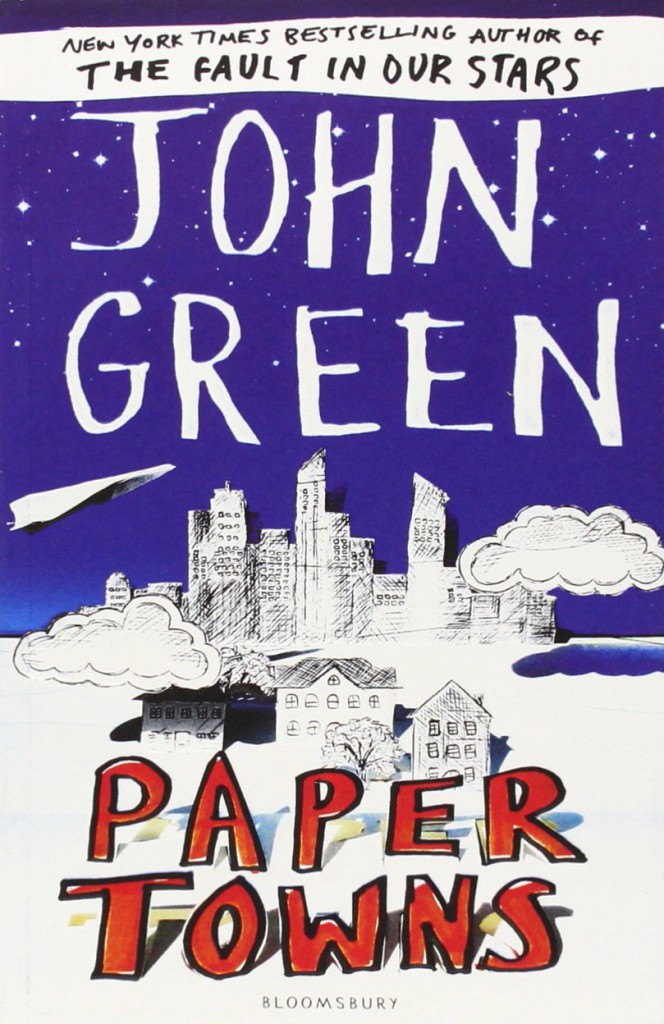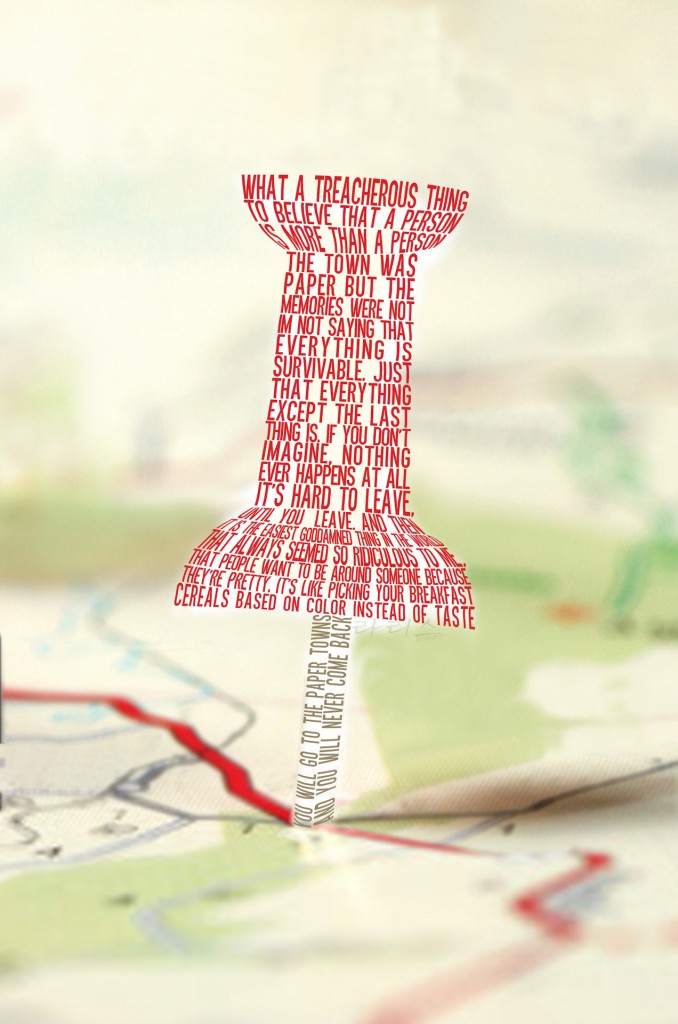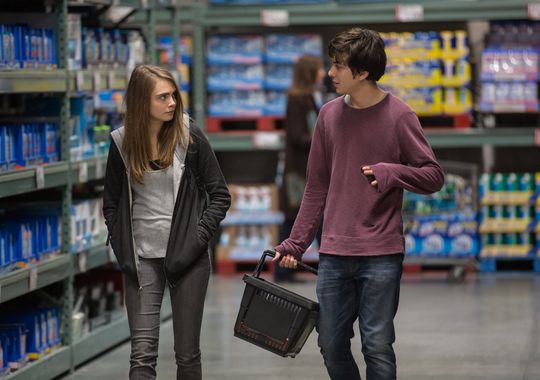I like to pretend I’m not, but when it comes down to it, I’m a book snob. All I really knew about John Green was that he wrote The Fault in Our Stars and the premise of that story sounded like the absolute worst torture ever. And then I saw the trailer for Paper Towns. Colour me intrigued. It actually looked really interesting and I happen to have a weird thing for Nat Wolff (I’m allowed to perv on younger men when they’re famous, ok?! It’s not creepy!).
After a weekend of binge watching teen films, I felt like immersing myself in yet more teenage angst, so decided to read the Paper Towns novel before the film came out. I surprised myself by completely and utterly loving it.
Premise
‘If you don’t imagine, nothing ever happens at all.’
 Quentin Jacobsen lives across the road from the coolest girl in school, Margo Roth Spiegelman. When they were kids, they had been friends, but they grew apart as Margo’s celebrity grew. Q went the way of band geeks and Margo latched onto the jocks and pretty people.
Quentin Jacobsen lives across the road from the coolest girl in school, Margo Roth Spiegelman. When they were kids, they had been friends, but they grew apart as Margo’s celebrity grew. Q went the way of band geeks and Margo latched onto the jocks and pretty people.
One night, Margo appears at Quentin’s window with a request – she’s got some ‘errands’ to run and needs a getaway driver with his own set of wheels (or in Q’s case, his mum’s wheels). Q throws his anxiety out the window and follows Margo on an increasingly bizarre vengeful adventure.
The next day, Quentin imagines the world will be different. And it is, but not in the way he had hoped. Margo is gone. He obsesses over where she is, whether she’s ok, and tries to follow the clues she has left him.
The novel
‘It is so hard to leave – until you leave. And then it is the easiest goddamned thing in the world.’
Some writers just get teenagers. It does make me wonder what they were like during their own teen years. Green’s language rings true, as do the concerns of his characters. At no point is he condescending or writing ‘down’ to his readers, the novel feels honest. It also feels original.
 Green has commented before that he doesn’t like to go for the obvious or cliché ending, something I appreciate. And I think the YA readers appreciate it as well – the honesty and lack of pandering to Hollywood ideals that are sold to young people in their books, TV, films, and magazines. In fact, Paper Towns addresses that issue head on – everyone around us, including those celebrities we admire, are real people. They won’t ever live up to the cult of their public persona if you were to know them in real life. So stop putting them on pedestals and stop holding yourself up to unachievable standards.
Green has commented before that he doesn’t like to go for the obvious or cliché ending, something I appreciate. And I think the YA readers appreciate it as well – the honesty and lack of pandering to Hollywood ideals that are sold to young people in their books, TV, films, and magazines. In fact, Paper Towns addresses that issue head on – everyone around us, including those celebrities we admire, are real people. They won’t ever live up to the cult of their public persona if you were to know them in real life. So stop putting them on pedestals and stop holding yourself up to unachievable standards.
What I particularly enjoyed about the novel is the way Green deals with quite serious issues without going into preachy, after school special style moralising. When Margo goes missing, Q worries that she may have killed herself and wonders why he seems to be the only one who is generally concerned for his friend. This deals with the issue of suicide amongst teens in an interesting way – not from the perspective of someone who is suicidal, but someone who is concerned a friend might be.
The plot moves quickly and is thoroughly intriguing. Q doesn’t manage to figure out the clues first time round, there are multiple red herrings and he makes mistakes. It’s real. He is frustrated but the reader is never frustrated with the story. Q is average enough to be almost universally relatable but also has enough personality to make him more interesting than a generic everyman. Simply put, the novel just works. It’s a brilliant YA novel.
The film
‘…the pleasure isn’t in doing the thing; the pleasure is in planning it.’
I am a huge Nat Wolff fan and he only cements my admiration further in this role. And Cara Delevingne (apart from her lack of curves) is an excellent Margo. The supporting cast are all very good, there’s no particular points of contention there. But the film is a serious disappointment.
 Only about a third of the book is presented and even what is included, it is changed… for the worse. It misses out entirely Q’s concerns that Margo has killed herself, thereby removing any real threat. Despite Green’s unconventional endings, we still know Q will find Margo – and without the question of whether he will find her dead or alive, there’s little to wonder about. A nice touch in the book is to avoid the typical US teen cliché of wrapping everything up before Prom, but the film studio would apparently not let go of that one. Q goes to Prom! And there’s no nudity under the graduation gowns!
Only about a third of the book is presented and even what is included, it is changed… for the worse. It misses out entirely Q’s concerns that Margo has killed herself, thereby removing any real threat. Despite Green’s unconventional endings, we still know Q will find Margo – and without the question of whether he will find her dead or alive, there’s little to wonder about. A nice touch in the book is to avoid the typical US teen cliché of wrapping everything up before Prom, but the film studio would apparently not let go of that one. Q goes to Prom! And there’s no nudity under the graduation gowns!
Perhaps in an attempt to appeal to more female viewers by including a female character that has a little more meat, Lacey is altered significantly. She’s presented as a beautiful but very nice girl. They’ve removed the underhanded bitchiness that worked so well in the book and also added in geeky personality quirks to make her more widely appealing. But here’s the thing, Paper Towns is essentially a male story and I don’t see why there’s anything wrong with that. The teen film landscape is saturated with films from the female perspective, I’m happy to see one from the opposite side, especially given that the entire point of the story is for the boys to stop seeing only what they want to see of the women in their lives and treat them like real people.
Verdict: The novel is well worth reading if you are all interested in YA literature. The film, however, is a disappointment. It misses many of the most interesting aspects of the novel, something that even Nat Wolff can’t salvage for the viewer.
Paper Towns is released in the UK on August 21st.
 Pop Verse Pop Culture Universe
Pop Verse Pop Culture Universe






